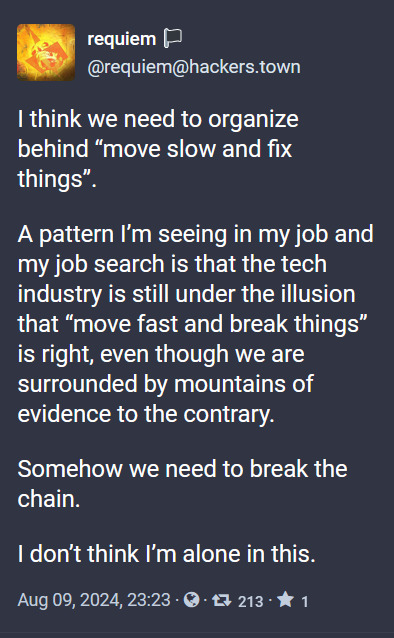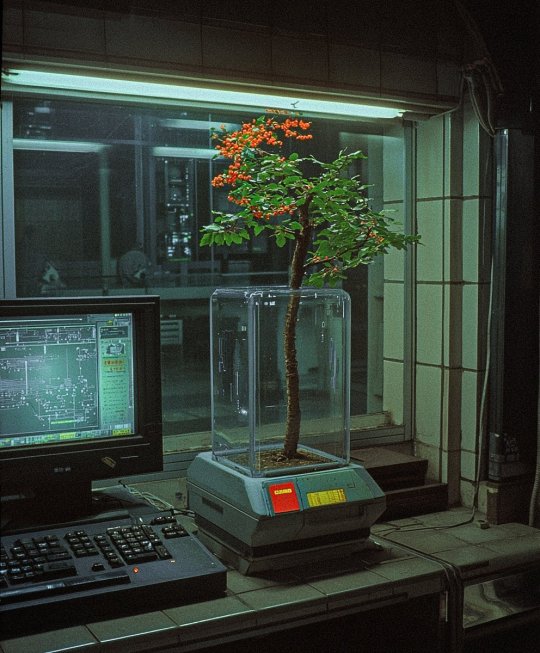#solarpunk and technology
Explore tagged Tumblr posts
Text
youtube
If technology wasn’t such a central aspect of solarpunk, we’d all just be hippies redux. Yet not all tech, right? Because solarpunk is also about living the good life while building a just, inclusive, and sustainable society. So, what is solarpunk’s attitude toward and relationship with tech? How do solarpunks decide what’s worth it and what’s beyond the pale? And what’s all this about appropriate technology?
#solarpunk#Solarpunk Presents Podcast#podcast#appropriate technology#solarpunk and technology#solarpunk's relationship to technology#high tech high life#social media#blockchain#bitcoin#can bitcoin be solarpunk#can the blockchain be solarpunk#how do solarpunks use technology#how should solarpunks think about technology#solarpunk technology#steampunk technology#cyberpunk technology#cryptocurrency#can cryptocurrency be solarpunk#science fiction genre#anti-capitalism#Youtube
10 notes
·
View notes
Text
"Scientists in Singapore have broken a long-standing limitation on the ability to generate electricity from flowing water, suggesting that another elemental force of nature could be leveraged for renewable electricity: rain.
With the simplest and smallest scale test setup, the team could power around 12 LED lightbulbs with simulated rain droplets flowing through a tube, but at scale, their method could generate meaningful amounts that could rival rooftop solar arrays.
Singapore experiences significant rainfall throughout the year, averaging 101 inches (2581 millimeters) of precipitation annually. The idea of generating electricity from such falling water is attractive, but the method has long been constrained by a principle called the Debye Length.
Nevertheless, the concept is possible because of a simple physical principle that charged entities on the surface of materials get nudged when they rub together—as true for water droplets as it is for a balloon rubbed against the hair on one’s head.
While this is true, the power values thus generated have been negligible, and electricity from flowing water has been limited to the driving of turbines in hydropower plants.
However, in a study published in the journal ACS Central Science, a team of physicists has found a way to break through the constraints of water’s Debye Length, and generate power from simulated rain.
“Water that falls through a vertical tube generates a substantial amount of electricity by using a specific pattern of water flow: plug flow,” says Siowling Soh, author of the study. “This plug flow pattern could allow rain energy to be harvested for generating clean and renewable electricity.”
The authors write in their study that in existing tests of the power production from water flows, pumps are always used to drive liquid through the small channels. But the pumps require so much energy to run that outputs are limited to miniscule amounts.
Instead, their setup to harness this plug flow pattern was scandalously simple. No moving parts or mechanisms of any kind were required. A simple plastic tube just 2 millimeters in diameter; a large plastic bottle; a small metallic needle. Water coming out of the bottle ran along the needle and bumped into the top section of the tube that had been cut in half, interrupting the water flow and allowing pockets of air to slide down the tube along with the water.
The air was the key to breaking through the limits set by the Debye Length, and key to the feasibility of electricity generation from water. Wires placed at the top of the tube and in the cup harvested the electricity.
The total generation rate of greater than 10% resulted in about 100 watts per square meter of tube. For context, a 100-watt solar panel can power an appliance as large as a blender or ceiling fan, charge a laptop, provide for several light bulbs, or even a Wi-Fi router.
Because the droplet speeds tested were much slower than rain, the researchers suggest that the real thing would provide even more than their tests, which were of course on a microscale."
-via Good News Network, April 30, 2025
#singapore#asia#rain#renewable energy#renewables#clean energy#electricity#science and technology#solarpunk#good news#hope
2K notes
·
View notes
Text
These tiny solar cells work using a process much like photosynthesis--photons hit the dye, electrons are released and then passed on to a special conductive material that harvests the electricity. They're designed to work in lower light conditions than traditional solar cells and are powerful enough to power small electronics up to the size of a keyboard.
The idea is that these tiny solar cells could replace small batteries for low-energy electronics--they last significantly longer and produce 90% fewer emissions per unit of energy than traditional batteries. Solar cells also remove the emissions from shipping and replacing batteries, although there are potentially some additional environmental costs associated with their production.
This is a really cool step towards having electronics that are powered by renewable energy on an individual level rather than requiring batteries.
#good news#hope#technology#solar energy#solar panels#solar cells#science#climate change#global warming#hopepunk#solarpunk#environment#ecology#batteries#electricity
1K notes
·
View notes
Text
You CAN be eco friendly with tech!!
Use energy saver mode
Dont keep your pc and chargers plugged in when not in use. Better yet, get outlets that can switch off.
Buy energy efficient products
Replace parts instead of scrapping the whole product, and when it is beyond repair, recycle or sell for parts
Replace your phone battery instead of buying a new phone
Buy used/refurbished. They’re just as good as new, but youre not contributing to more demand
Try to buy local
Buy sustainably sourced accessories or ones that can be easily composted or properly disposed of
Use Ecosia to plant trees while you search
Use wildhero to plant trees with your email
Limit AI usage
775 notes
·
View notes
Text
i am often reminded that i might be making the only solarpunk media that makes you wanna rip your eyeballs out
#i know solarpunk as a genre is like#idk happy#utopic#green grass and windmills and#uhhh yogurt commercials#im just curious where all these wide open fields and endless green computer technologies are coming from post climate apocalypse#or is most solarpunk AU stuff where we don't live on this version of earth#this is my own vision tho and everybody can make what they want#obviously#i don't even know if FTS fits the solarpunk genre specifically because it isn't happy or revisionist#i just feel like on this planet#solarpunk comes when there is literally nothing else left#tess talks
136 notes
·
View notes
Text

289 notes
·
View notes
Text
i'm just so tired. tired of keeping up with every new thing that ai can do. every new technological change happening. every new crisis the planet is facing as a result of 'innovation'. every time i have to re-learn the dynamics, rules and workings of the modern world and society. it's all too much and happening too fast. let's all just calm down.
#art#ai#technology#industrialism#capitalism#solarpunk#slow living#simple#minimalist#community#innovation#change#time#modern world#modern society#industrial revolution#future#dystopian#artifical intelligence#big tech#nature#man made#humanity#human world#relatable#climate change#crisis#technological advancement#science#western medicine
59 notes
·
View notes
Text
I really hope they can work the bugs out of this solution, because if it's done right, it'll really be a win-win situation. Less evaporation of water, and solar power being generated every day? Yes, please. We are smart, resourceful beings, and this is far from the most difficult problem we've had to address.
This is also a great example of how we can go back and fix mistakes of the past. We very, very rarely ever come up with technological solutions that take long-term effects on the environment into consideration, and so the way many things are designed often leads to some sort of damage, whether through manufacture, use, disposal, or all of the above. Retrofitting canals (which have been used in agriculture for thousands of years) will have benefits not only in the ways mentioned above, but also gets people thinking more about the impacts we make.
I'm hoping that this will lead to more new technology being developed in ways that already anticipate and account for negative impacts so that they avoid them in the first place, rather than having to engineer new solution many years down the line.
#solar power#solar panels#renewable energy#water#environment#irrigation#agriculture#green energy#conservation#technology#clean energy#science#solarpunk#hopepunk
698 notes
·
View notes
Text
I don’t think I ever feel more like I’m living in the future than when I’m walking my dogs across some grass in my neighborhood and one of the robot lawnmowers owned by our housing association rolls by and we have to sidestep a bit to avoid it but the dogs mostly ignore it and we continue on our way.
I was born well before the internet and smartphones but there’s just something about seeing a little machine roughly the size of my dogs so perfectly part of the landscape that animals aren’t even afraid of it. They’re so sensitive to touch now I’ve seen it bump into a hedgehog and stop.
Of all our innovations it was a little robot buzzing around in the grass that got me.
623 notes
·
View notes
Text
if you want to see actually good solarpunk aesthetics you should rly look for the people mixing it with afrofuturism that shit is amazing and doesn't usually hold the same "uwu perfectworld cottagecore" bs that more mainstream solarpunk art tends towards
#now if only solarpunk could have an actual ideology#instead of just being anarchism but with pretty plants on it#like no shade just at least come up with smthn new other than aesthetics#i think an aesthetic focus on technology facilitating sustainability is pretty cool it's not like... political philosophy tho
29 notes
·
View notes
Text
A New Resin is Able to Recycle Wind Turbine Blades Into Products Like Countertops and Diapers

From this article in Anthropocene Magazine:
Some companies are finding ways to recycle blades by shredding them and reusing the fiberglass and plastic resin to make cement and plastics. But the world will produce over 40 million metric tons of turbine blade waste by 2050, according to one study. That scale highlights an urgent need to make recycling blades easier. To address the issue, chemical engineering and materials science professor John Dorgan and colleagues developed a new resin made of a synthetic polymer and the plant-based polymer polylactide, or PLA, which is used to make biodegradable packaging. Fiberglass panels that the team made with the new resin were strong and durable enough for wind turbines and boat hulls. To recycle the panels, the researchers dissolved them in a solution and removed the glass fibers. The resin could then be used to make new panels or mixed with different minerals to make cultured stone for kitchen countertops. What’s more, the researchers could also treat the recovered resin in an alkaline solution to make an acrylic material for car lights or the absorbent material used in diapers. With some more chemical processing, they made a food preservative called potassium lactate, with which Dorgan’s team made gummy bears.
#wind power#wind energy#wind farm#wind turbine#recycling#clean energy#renewable energy#technology#adaptation#good news#hope#hopepunk#solarpunk#climate change#global warming
283 notes
·
View notes
Text

#webcore#solarpunk#ecopunk#frutiger eco#frutiger aero#what you want#touch grass#touching grass#tech#computers#divine machinery#divine technology
39 notes
·
View notes
Text
Something that has been on my mind lately: revolution.
What does that really look like?
How does that work right now?
I blame my current media consumption. Rewatching Andor. Rereading the hunger games and reading its subsequent prequels. Rewatching Anon. Binging Leverage and Person of Interest. Hunting down old copies of Uglies and Maximum Ride. Rewatching Equilibrium. Going through old research for cyberpunk and solarpunk worlds I built for me.
I feel a huge dissatisfaction with the world. While not as extreme as the dystopian worlds above, so many tiny injustices piling up. A 50 hour work week just to make ends meet. Pausing a movie to catch a detail but only seeing an ad. Watching multiple sources pull different details out of context to highlight their narrative. A new system at work to “maximize oversight”. Another company mining my data.
And unlike most of the dystopias, there is no one tyrannical entity behind it all. A single place to focus my fury. It’s not just an Evil Corporation out to make maximum profits. It’s not a Totalitarian Government determined to control a populous.
It is multiple corporations trying to make a profit. It is different factions of government all trying to get their agenda pushed. It is all these different companies and parties and individuals scrambling for power and control and safety.
I just want to run away from it all.
When I was younger, I wanted the power to change the world. I wanted to be the Chosen One; to defeat a Great Evil and stop all the wrongs. I sought out ways to increase my power and influence, sure I would use them for the good and safety of everyone.
Which is exactly how you become the Great Evil that must be defeated.
Now I just want enough money and enough power to be left alone. Enough influence to get the things I need.
I see no way to achieve this in the world I currently live in. I want the powers that be to leave me alone. Yet in their version of the world, that is a threat. Anyone or anything outside of their sphere of influence, outside of their grasp, is a danger to the systems that currently hold our world in place.
There’s no one place to concentrate the fight, to rebel against. So many people say pick one thing and fight that. But there are too many things I care deeply for. Too many injustices to push back against. But that just plays into their hands. They want me hopeless. They want me overwhelmed. They want me to be apathetic and inactive.
I just need to find a way forward.
I’ll let you know when I find it.
#yelling into the void#revolution#andor#the hunger games#sotr#bosbas#anon movie#leverage#person of interest#uglies#solarpunk#cyberpunk#invasive technology#self-governance#All revolutions are impossible until they happen. Then they become inevitable#Freedom is a pure idea#you invade my privacy it’s nothing#I try to get it back it’s a crime#it’s not that I have something to hide I have nothing I want you to see#we can’t control what we can’t see#Maybe they didn't want you to realize that every civilization has its weaknesses#When everything is over when the worst has happened there's still one thing left in Pandora's Box: hope.
14 notes
·
View notes
Text
You know you're down a rabbit hole when you miss the whole day by spending 12 hours straight on research and world-building.
#good news‚ I've expanded my renewable energy sources knowledge pool#who says high fantasy can't have solarpunk technology?#not me‚ that's for damn sure
12 notes
·
View notes
Text

from Mac Baconai
#cyberpunk#technology#glowy#scifi#plant#ai art#ai generated#futurism#futuristic#retro aesthetic#solarpunk
22 notes
·
View notes
Text
Fully fuel-free solar oven









12 notes
·
View notes